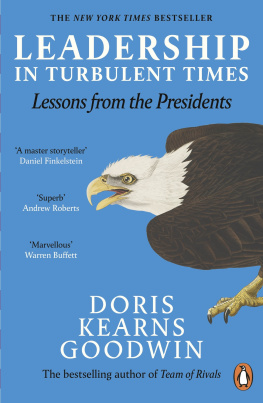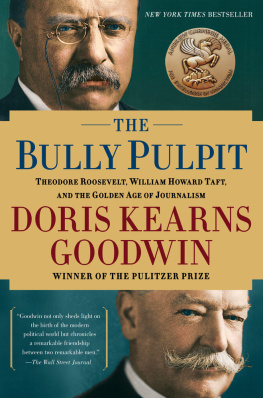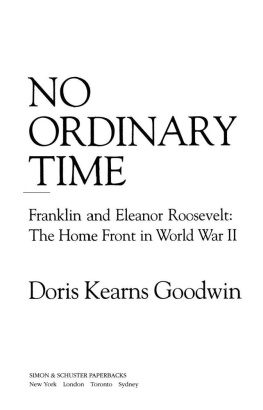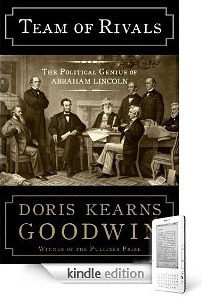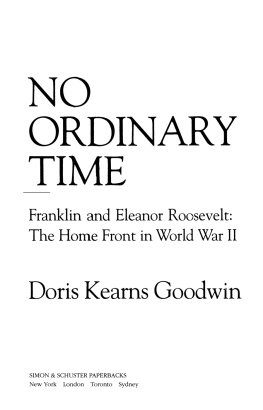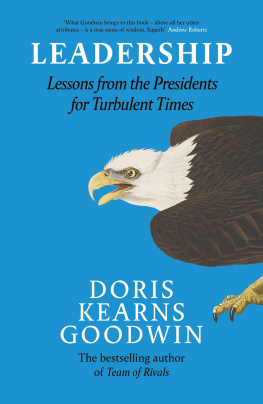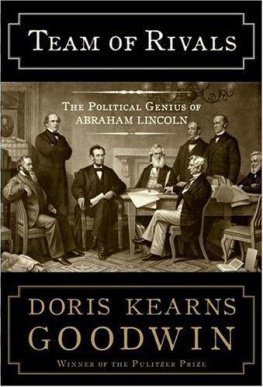Doris Kearns Goodwin - Leadership in Turbulent Times: Lessons from the Presidents
Here you can read online Doris Kearns Goodwin - Leadership in Turbulent Times: Lessons from the Presidents full text of the book (entire story) in english for free. Download pdf and epub, get meaning, cover and reviews about this ebook. year: 2018, publisher: Penguin Books Ltd, genre: Detective and thriller. Description of the work, (preface) as well as reviews are available. Best literature library LitArk.com created for fans of good reading and offers a wide selection of genres:
Romance novel
Science fiction
Adventure
Detective
Science
History
Home and family
Prose
Art
Politics
Computer
Non-fiction
Religion
Business
Children
Humor
Choose a favorite category and find really read worthwhile books. Enjoy immersion in the world of imagination, feel the emotions of the characters or learn something new for yourself, make an fascinating discovery.
- Book:Leadership in Turbulent Times: Lessons from the Presidents
- Author:
- Publisher:Penguin Books Ltd
- Genre:
- Year:2018
- Rating:3 / 5
- Favourites:Add to favourites
- Your mark:
- 60
- 1
- 2
- 3
- 4
- 5
Leadership in Turbulent Times: Lessons from the Presidents: summary, description and annotation
We offer to read an annotation, description, summary or preface (depends on what the author of the book "Leadership in Turbulent Times: Lessons from the Presidents" wrote himself). If you haven't found the necessary information about the book — write in the comments, we will try to find it.
Leadership in Turbulent Times: Lessons from the Presidents — read online for free the complete book (whole text) full work
Below is the text of the book, divided by pages. System saving the place of the last page read, allows you to conveniently read the book "Leadership in Turbulent Times: Lessons from the Presidents" online for free, without having to search again every time where you left off. Put a bookmark, and you can go to the page where you finished reading at any time.
Font size:
Interval:
Bookmark:
The Bully Pulpit:
Theodore Roosevelt, William Howard Taft, and the Golden Age of Journalism
Team of Rivals:
The Political Genius of Abraham Lincoln
Wait Till Next Year:
A Memoir
No Ordinary Time:
Franklin and Eleanor Roosevelt:
The Home Front in World War II
The Fitzgeralds and the Kennedys
Lyndon Johnson and the American Dream
UK | USA | Canada | Ireland | Australia
India | New Zealand | South Africa
Viking is part of the Penguin Random House group of companies whose addresses can be found at global.penguinrandomhouse.com.

First published in the United States of America as Leadership in Turbulent Times by Simon & Schuster 2018
First published in Great Britain as Leadership by Viking 2018
Copyright Blithedale Productions, Inc., 2018
The moral right of the author has been asserted
Cover image: John James Audubon (1785-1851), Plate 14, White-Headed Eagle from The Birds of America, 1827-38, (hand-coloured lithograph) The Trustees of the Natural History Museum, London
ISBN: 978-0-241-98771-1

For my husband, Richard Goodwin, and our best man and closest friend, Michael Rothschild
Abraham Lincoln, Theodore Roosevelt, Franklin Roosevelt, and Lyndon Johnsonthe lives and times of these four men have occupied me for half a century. I have awakened with them in the morning and thought about them when I went to bed at night. By immersing myself in manuscript collections, personal diaries, letters, oral histories, memoirs, newspaper archives, and periodicals, I searched for illuminating details that, taken together, would provide an intimate understanding of these men, their families, their friends, their colleagues, and the worlds in which they lived.
After writing four extensive books devoted to these men, I thought I knew them well before I embarked on this present study of leadership nearly five years ago. But as I observed them through the exclusive lens of leadership, I felt as if I were meeting them anew. There was much to learn as the elusive theme of leadership assumed center stage. As I turned to works of philosophy, literature, business, political science, and comparative studies, in addition to history and biography, I found myself engaged in an unexpectedly personal and emotional kind of storytelling. I returned to fundamental questions I had not asked so openly since my days of college and graduate school.
Are leaders born or made? Where does ambition come from? How does adversity affect the growth of leadership? Do the times make the leader or does the leader shape the times? How can a leader infuse a sense of purpose and meaning into peoples lives? What is the difference between power, title, and leadership? Is leadership possible without a purpose larger than personal ambition?
How fondly I remember long and heated sessions over just such questions with my graduate school friends, arguing through the night with a fervor surpassing our level of knowledge. Yet, at bottom, something in these discussions was exactly on the mark, for they engaged us deeply, tapped our idealism, and challenged us to figure out how we wanted to live our own lives. I realize now that debates such as these put me on the path to find my own calling as a historian.

In we see the four men when they first entered public life. In their twenties, when they set forth to forge their public identities, they appear very different from the sober, iconic countenances that have since saturated our culture, currency, and memorial sculpture. Their paths were anything but certain. Their stories abound in confusion, hope, failure, and fear. We follow mistakes made along the way, from inexperience, cockiness, lack of caution, outright misjudgments, and selfishness, and see the efforts made to acknowledge, conceal, or overcome these mistakes. Their struggles are not so different from our own.
No single path carried them to the pinnacle of political leadership. Theodore Roosevelt and Franklin Roosevelt were born to extraordinary privilege and wealth. Abraham Lincoln endured relentless poverty. Lyndon Johnson experienced sporadic hard times. They differed widely in temperament, appearance, and physical ability. They were endowed with a divergent range of qualities often ascribed to leadershipintelligence, energy, empathy, verbal and written gifts, and skills in dealing with people. They were united, however, by a fierce ambition, an inordinate drive to succeed. With perseverance and hard work, they all essentially made themselves leaders by enhancing and developing the qualities they were given.
All four men were recognized as leaders long before they reached the presidency. And like rocks in a polishing cylinder, all four were brought to shine by tumbling contact with a wide variety of people. They had found their vocation in politics. , American philosopher William James wrote of the mysterious formation of identity, that the best way to define a mans character would be to seek out the particular mental or moral attitude in which, when it came upon him, he felt himself most deeply and intensely alive and active. At such moments, there is a voice inside which speaks and says, This is the real me!
Dramatic reversals that shattered the private and public lives of all four men are the subject of . They were at different life stages when forced to deal with events that ruptured their sense of self and threatened to curtail their prospects. The nature of the adversity that assailed each was unique: Abraham Lincoln suffered a blow to his public reputation and his private sense of honor that led to a near-suicidal depression; Theodore Roosevelt lost his young wife and his mother on the same day; Franklin Roosevelt was struck by polio and left permanently paralyzed from the waist down; Lyndon Johnson lost an election to the United States Senate. To draw an analogy between an election loss and the tragic reversals experienced by the others would appear, on the surface, ludicrous; but Lyndon Johnson construed rejection by the people as a judgment upon, and a repudiation of, his deepest self. For a long while, the election loss negatively changed the direction of his career until a massive heart attack and the proximity of death repurposed his life.
Scholars who have studied the development of leaders have situated resilience, the ability to sustain ambition in the face of frustration, at the heart of potential leadership growth. More important than what happened to them was how they responded to these reversals, how they managed in various ways to put themselves back together, how these watershed experiences at first impeded, then deepened, and finally and decisively molded their leadership.
will bring the four men to the White House. There, at their formidable best, when guided by a sense of moral purpose, they were able to channel their ambitions and summon their talents to enlarge the opportunities and lives of others. Specific stories of how they led will explore the riddle: Do leaders shape the times or do the times summon their leaders?
Font size:
Interval:
Bookmark:
Similar books «Leadership in Turbulent Times: Lessons from the Presidents»
Look at similar books to Leadership in Turbulent Times: Lessons from the Presidents. We have selected literature similar in name and meaning in the hope of providing readers with more options to find new, interesting, not yet read works.
Discussion, reviews of the book Leadership in Turbulent Times: Lessons from the Presidents and just readers' own opinions. Leave your comments, write what you think about the work, its meaning or the main characters. Specify what exactly you liked and what you didn't like, and why you think so.

